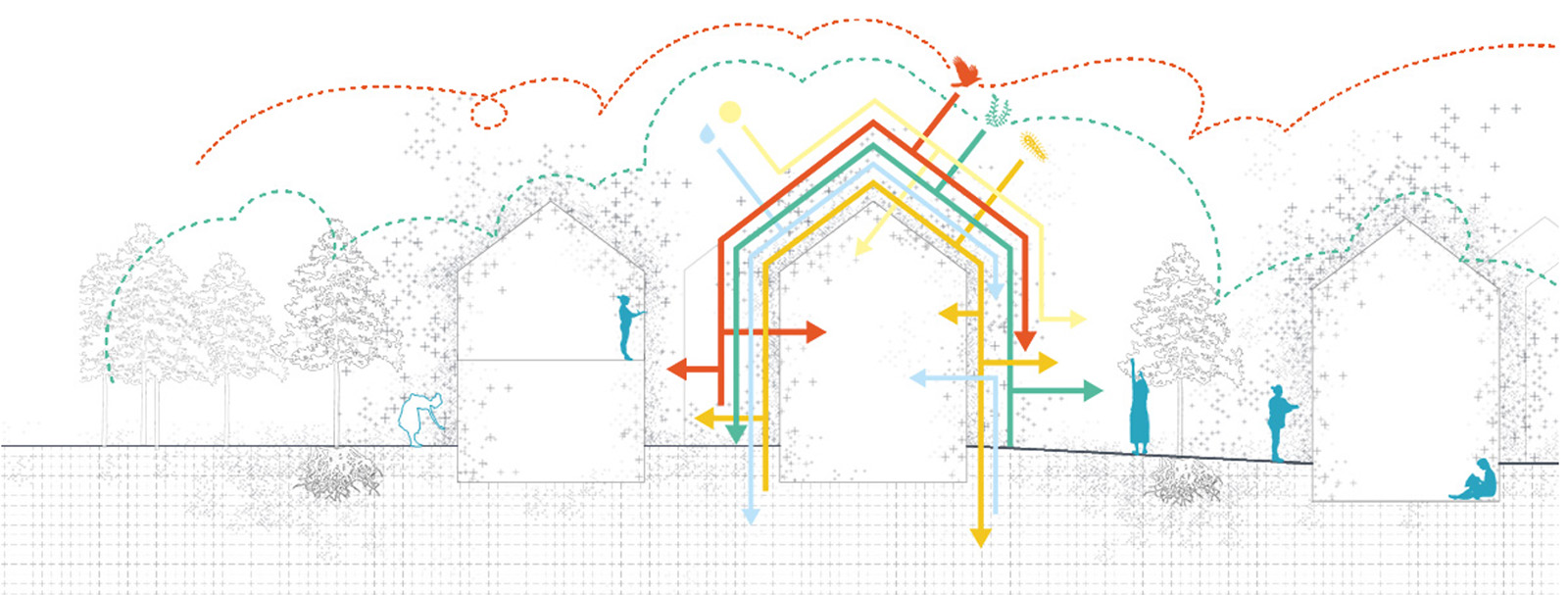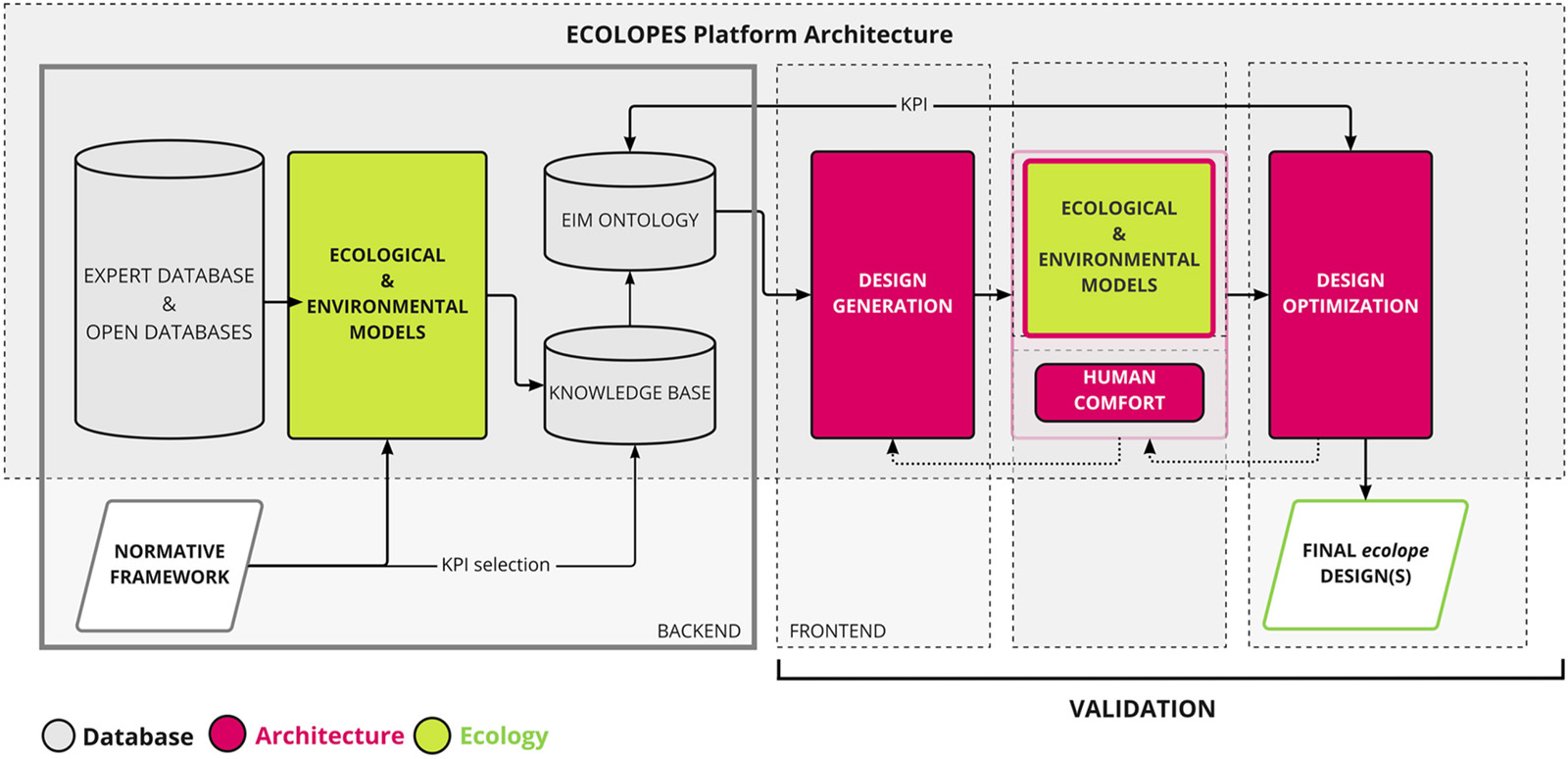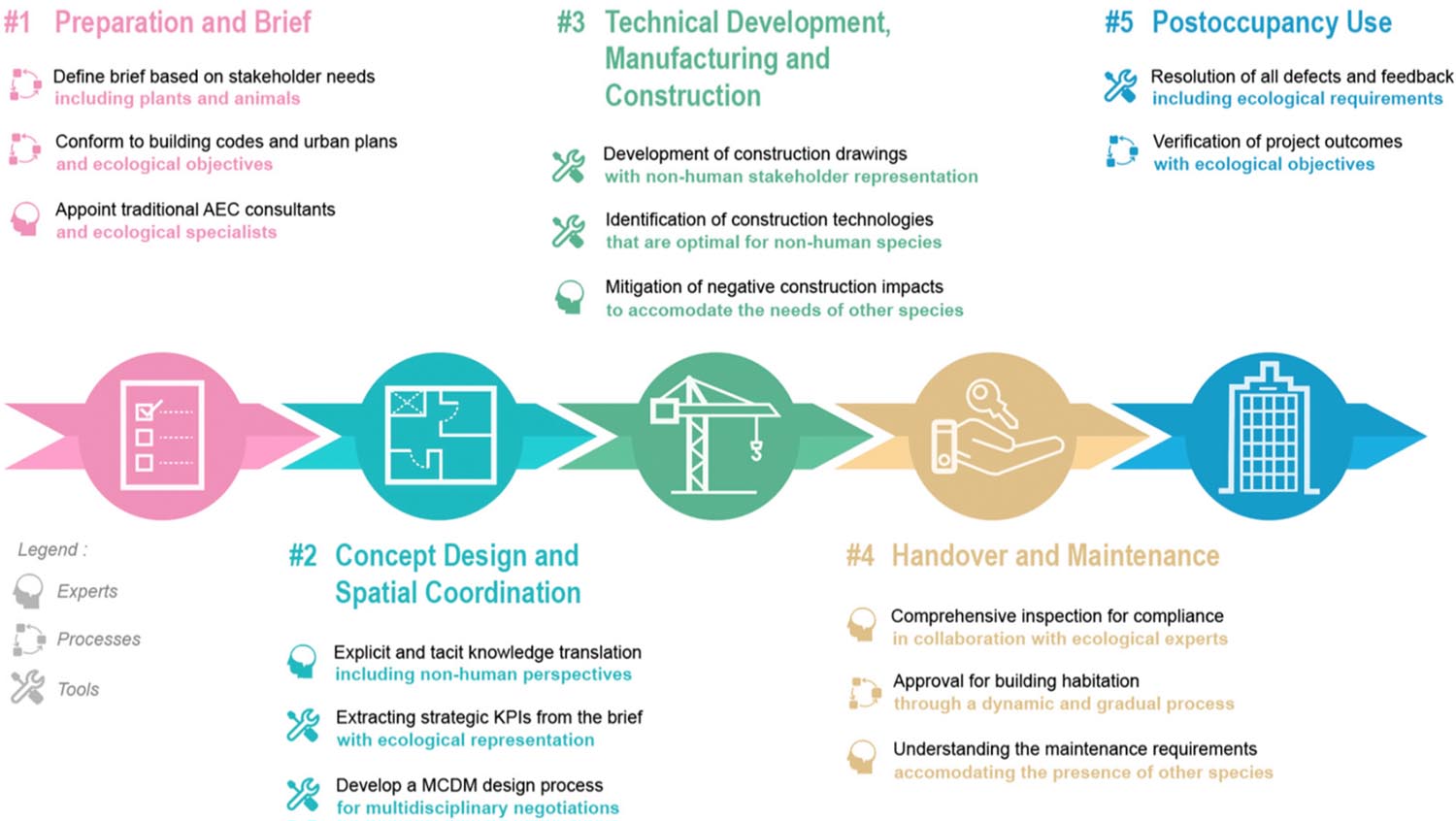
ECOLOPES: a game-changing design approach for regenerative urban ecosystems
The global urban population is projected to increase from 55% to 68% by 2050, creating a highly urgent demand for habitable urban areas. Moreover, the size of cities is expanding exponentially at an annual rate of 2.4%, resulting in rapid urbanization. This negatively influences the quality of life for humans and urban biodiversity. The ever-growing extent of these impacts requires interdisciplinary action from architectural and ecological disciplines to formulate holistic mitigation strategies. Current design practices are often dependent on green infrastructure as a solution. While beneficial, green infrastructures are primarily designed using vegetation for human-centered objectives and rarely support other living organisms. The lack of design intentionality toward “non-human” species limits opportunities to holistically integrate natural ecosystems into the urban fabric. Furthermore, there are no existing tools to help designers use ecological knowledge for better-informed design decision-making.
The EU-funded ECOLOPES research project addresses these limitations by proposing an ecology-driven methodology and tool to aid in the design of multi-species building envelopes.
Multi-species building envelopes aim to mitigate the negative effects of urbanization through ecologically informed design. Building envelopes are strategic for multi-species intervention due to several factors: Firstly, building envelopes influence the quality of environmental conditions by mediating indoor and outdoor environments. Environmental quality regulation (e.g., temperature, air quality, and sound insulation) is an essential component in ensuring optimal living conditions for multi-species interactions. Secondly, building envelopes form a large area of urban surfaces in which urban heat island interreflections occur. These extensive surface areas require well-informed design solutions to alleviate urban environmental degradation and sustain natural ecosystems. Thirdly, the design of building envelope elements (e.g., walls and roofs) directly affects a building's sustainability and energy performance. A key factor in building operations, energy performance is highly influenced by the building envelope's material properties and geometric configurations. Materiality and geometry are also important parameters in determining a design solution's ability to be colonized by living organisms (i.e., bioreceptivity). Clearly, building envelopes have the potential to support multi-species cohabitation while improving environmental and building performance through informed design considerations.
The project will transform the envelope into an ecolope, a multi-species living space for four types of inhabitants, humans, plants, animals, and microbiota. ECOLOPES will develop the core technologies for designing ecolopes in a systematic way, considering the needs of both humans, as well as of plants, animals and beneficial microbes. ECOLOPES will make biological knowledge available for the architectural design process, to find architectural solutions that enable synergies and limit conflicts between the inhabitants. The ecolopes designed by this multi-species approach will restore the beneficial human – nature relationships in cities.

A key element of ECOLOPES will be an Information Model that integrates ecological and architectural knowledge, data and models into a data-integrated design recommendation system. The ECOLOPES Information Model will guide the development of the ECOLOPES Computational modelling and simulation environment, to make biological and architectural knowledge available for design.

Within the Ecolopes project T_CODE the development of a multi-criteria decision-making methodology and tool. The methodology and tool will facilitate interdisciplinary design decision-making within computational design processes. It will enable designers to employ ecological knowledge in an interdisciplinary manner for designing and evaluating multi-species building envelopes.
Funding: The project is sponsored by the European H2020 FET OPEN grant - agreement number 964414
The project consortium comprises six partners:
The Technical University of Munich, Vienna University of Technology, University of Genoa,
Technion – Israel Institute of Technology, Studio Animal Aided Design, McNeel Europe
Scientific papers that were published on this research:
Uthaya Selvan. S, Saroglou, S. T. Joschinski, J. Calbi, M. Vogler, V. Barath, S. and Grobman, Y.J. “Towards multi-species building envelopes: A critical literature review of multi-criteria decision-making for design support” Accepted to the Journal of Building and Environment. January 10th, 2023. DOI: 10.1016/j.buildenv.2023.110006
Weisser, W.W., Hensel, M., Barath, S. Culshaw, V., Grobman, Y. J., Hauck, T.E., Joschinski, J., Ludwig, F., Mimet, A., Perini, K., Roccotiello, E., Schloter, M., Shwartz, A., Sunguroğlu Hensel, D., Vogler, V. Creating ecologically sound buildings by integrating ecology, architecture and computational design. People and Nature. 8th December 2022. DOI:10.1002/pan3.10411
Perini, K., Barath, S., Canepa, M., Hensel, M., Mimet, A., Mosca, F., Roccotiello, E., Selami, T., Sunguroğlu Hensel, D., Tyc, J., Utahya Selvan S., Vogler V., Weisser W.W., (2021). ECOLOPES - A multi-species design approach to building envelope design for regenerative urban ecosystems. In: Responsive Cities: Design with Nature. Symposium Proceedings 2021 (IAAC).
Canepa, M., Mosca, F., Barath, S., Changenet, A., Hauck, T. E., Ludwig, F., Roccotiello, E., Pianta, M., Uthaya Selvan, S., Vogler, V., & Perini, K. (2022). ECOLOPES, Beyond Greening: A multi-species approach for urban design. AGATHON - International Journal of Architecture, Art and Design, 11, 238–245. DOI:10.19229/2464-9309/11212022
Uthaya Selvan, S. Saroglou, S. T. Tik, j., Joschinski, J., Fraguada, M., Vogler, V., Weisser, W., Grobman, Y.J. and Barath, S. “Multi-Species Building Envelopes: Developing a Multi-Criteria Design Decision-Making Methodology for Cohabitation”. The proceedings of the 28th CAADRIA Conference, India. 2023.
Grobman, Y. J., Weisser, W.W., Shwartz, A., Ludwig, F., Kozlovsky, R., Ferdman, A., Perini, K., Hauck, T.E., Uthaya Selvan, S., Saroglou, S., Barath, S., Schloter, M., Windorfer, L. “Architectural multispecies building design: concepts, challenges, and design process” Sustainability journal. October 2023. DOI: 10.3390/su152115480
Teaching related to this research:
Computer aided fabrication



